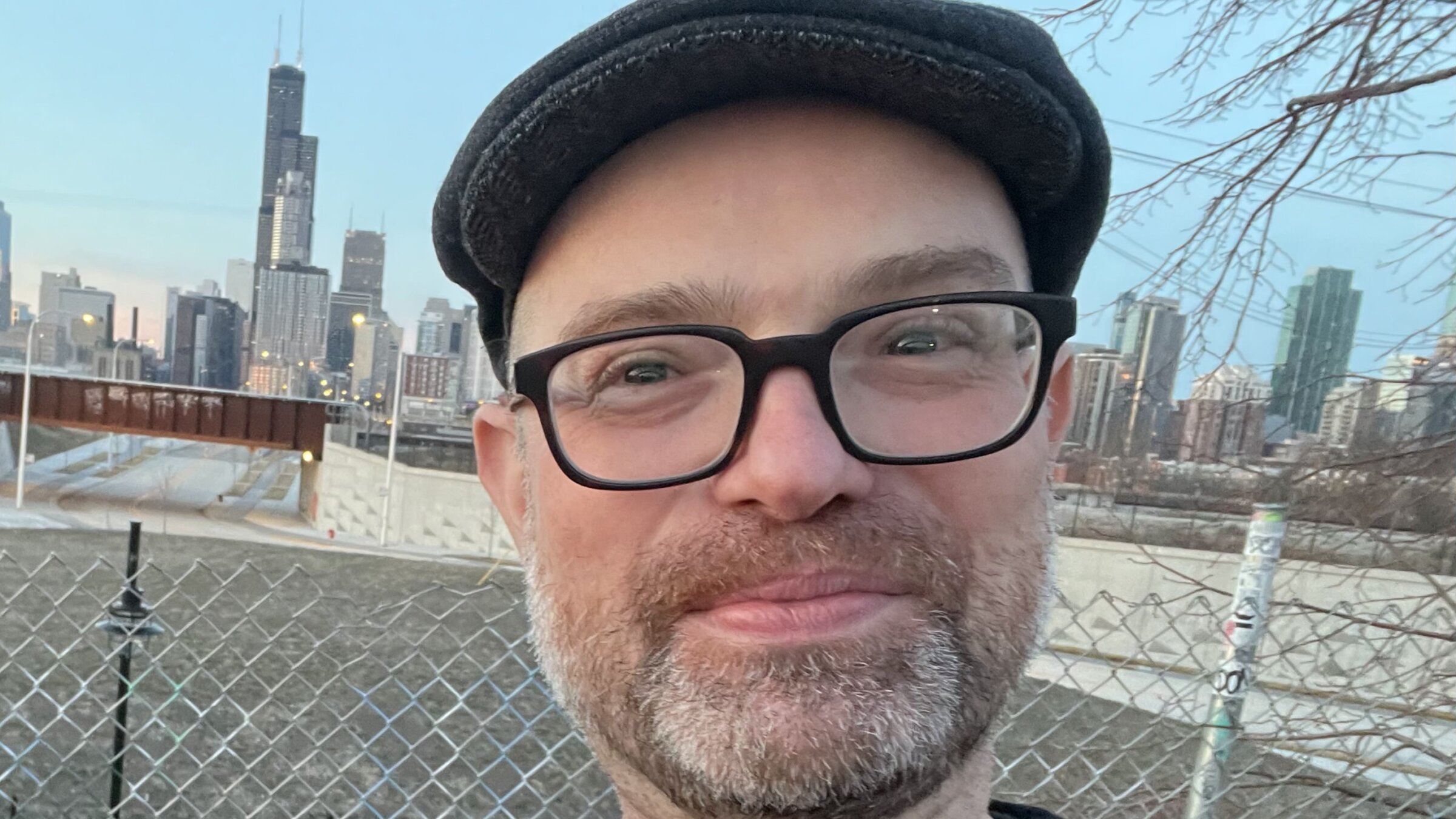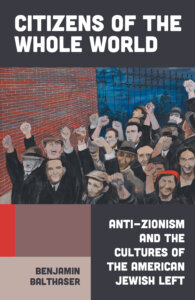For this historian, anti-Zionism is part of a hallowed Jewish tradition
In ‘Citizens of the Whole World,’ Benjamin Balthaser explores the buried legacy of the American Jewish Left — and why it’s resurfacing now

Benjamin Balthaser is the author of Citizens of the Whole World: Anti-Zionism and the Cultures of the American Jewish Left. Photo by Benjamin Balthaser
In 1935, the leftist magazine The New Masses published a scathing profile of the militant Zionist Vladimir Jabotinsky, blasting his visions of empire in Palestine and calling him a “Jewish Hitler.” The writer, an aspiring filmmaker named Robert Gessner, condemned Jabotinsky’s collaboration with Polish antisemites, denounced his nationalist ambitions, and even mocked him for being short.
Gessner also predicted failure for Jabotinsky’s plans to raise money in the United States. “In America,” he wrote, “Jews are about one percent Zionist.” The young leftist was not an outlier but a voice of the Jewish mainstream of his time.
Almost 90 years later, a recent Pew Research poll finds that 74% of American Jews have favorable feelings about Israel. A poll of Israelis finds the majority aligned with Jabotinsky’s insistence on violent expulsion of Palestinians from the land. And the current Israeli government is a direct ideological descendant of the Irgun. Jabotinsky and his vision would seem to have the upper hand.
Gessner, meanwhile, doesn’t even have a Wikipedia page.

But over the past decade — and especially over the past 20 months — we’ve seen a resurgence of Gessner’s critique, voiced collectively by Jewish Voice for Peace, IfNotNow, and similar organizations, as well as individually by writers like Peter Beinart, Judith Butler, Shaul Magid and Naomi Klein. In his new book Citizens of the Whole World: Anti-Zionism and the Cultures of the American Jewish Left, Benjamin Balthaser argues that these voices are channeling at least a century of Jewish revolutionary thought — thought that he maintains has been marginalized, misrepresented, and at times intentionally suppressed, but never fully erased.
As a cultural studies scholar and avowed leftist, Balthaser shuns top-down narratives, turning instead to close readings of writers, poets, pamphleteers, filmmakers, artists and cultural critics working outside of mainstream institutions. He also draws from in-depth — and often very funny — interviews with veteran activists who personally experienced and contributed to Jewish leftist movements over the past decades. 320 pages long and nine years in the writing, Citizens of the Whole World acts as both archive and intervention — a rigorously argued and timely assertion that the Jewish radical imagination has always blazed bright as an alternative and a response to fascism.
Balthaser spoke with me from his office at Indiana University, where he is an associate professor of multiethnic U.S. literature, about the inspiration for the book, the fantasy of Jewish consensus, and why Project Esther is a new Red Scare.
This interview has been edited for length and clarity.
How did you first come to this project?
My mom’s side were members of the communist party, as were a number of my great aunts and uncles. And my mom was kind of a ’60s New leftist and committed activist for my entire life. My grandpa was a fairly blunt and plainspoken person — an intellectual, but one with a less than eighth grade education — and he would always say that the land already belonged to somebody else, and that no matter what, Israel was going to end up a theocracy.
So I grew up with this secular Jewish anti-Zionist memory. It’s something I’ve been thinking about since my 20s.
Does that memory differ from Jewish anti-Zionism today?
Today, we often hear a lot of arguments based on Jewish values, or the ethical presumptions of Jewish religion. These are very important arguments, but I was also interested in other articulations around Israel and Zionism. Many Jewish social movements of the 20th century were very much framed within an understanding of America as an empire, and so they had a class analysis of Zionism: They saw it as bourgeois, ethnic fascism, and they had analyzed fascism itself as a class project. And I think it’s useful to embrace the historically Jewish left, because it can help us articulate a sense of politics today.
In your research, you read and spoke with people who were a part of those traditions, but also engaged with how memories of the Jewish left show up in more mainstream figures like the Coen brothers and Neil Simon — sometimes unexpectedly. You describe it as both here and not here, calling it a “citational presence.”
The way that disavowed memories work in culture is that they are articulated and buried at the same time, right? So when you watch popular “Jewish” television, you’re often going to see the Left surface in a way that it doesn’t with other ethnic groups: Woody Allen jokes about the magazine Dissent in Annie Hall, the Coen brothers’ films reference Trotskyites, Larry David shows up as the neighborhood communist in Radio Days.
You also reference the “Palestinian Chicken” episode of Curb Your Enthusiasm, where Larry David insists, “This is America; you can build a restaurant wherever you want.” Whether citing David or someone like Seth Rogen saying, “I’m not going to go live in Israel,” you gesture towards a diasporic indifference to the idea of Israel as the Jewish homeland. Is this connected to our fairly successful assimilation in America?
Yes. Larry David’s a liberal. Rogen’s a liberal. Philip Roth’s a liberal. To them, Israel is basically just the Florida suburbs or something.
You describe Roth as the “liberal version of diasporism’s most articulate champion, satirizing West Bank settlers, Sabra kibbutzim, and neo-fascist Israeli politicians as either humorless automatons or messianic if violent fools.”
I think Roth’s critique of Zionism is also embedded with his notion of being a white male American, and, again, a liberal: What would I want to have to do with that country of crazies and wackos? Why would I want to go back to the Jewish ghetto, when I have a really nice life in America?
And Roth also writes sympathetically about the Communist Party. For example, I Married a Communist may be more interested in the characters’ affairs than their politics, but it’s still a sympathetic portrait of a working class Jewish communist in the 1940s.
In the book you refer to Bernard Lazare, and his assertion that Jewish history tends to be told “by the bourgeoisie for the bourgeoisie.” How does that impact the ways in which Jews remember and understand our own history in the United States?
I kept thinking as I was writing — and I don’t want to sound either overly humble or overly arrogant — that this book should have already been written. There should already be a popular history of American Jewish progressive anti-Zionism.
I was trained to tell cultural history that starts from the bottom and moves up. If you think about Jewish history from that context, it can help make sense of what’s happening today. For example, the official bourgeois Jewish institutions are all Zionist, and yet Mamdani wins the Jewish vote in New York City.
So who do these institutions represent? Not the working class students, or Jews who are social workers or teachers. They’re representing the interests of their own wealthy donors.
So these fissures are not new?
If you read Commentary in the 1950s, you’ll see screeds against communists and against the Jewish left. And they wrote the Rosenbergs out of the Jewish world, metaphorically excommunicating them from the community. You could even say metaphorically rendering them stateless, in the same way that Nazis would render someone stateless before they killed them. It was very deliberate, very chilling.
There has always been a Jewish bourgeoisie, and it has never been nice. It’s just much more reactionary than it used to be, and has a lot more power than it used to, and it is much more open about it. And if there’s any value to what history can provide, it’s that it can help us to not be confused at this moment. This is anti-communism, pure and simple, and Project Esther is a new Red Scare. It’s targeting internationalism, targeting the left, and, ultimately, also targeting Jews.
I’m not against the idea of Jewish peoplehood, but a lot of us have bought this kumbaya version of it, where we’re all somehow in the tikkun olam training together. And we aren’t.
Can we even say that there is something specifically Jewish about this current incarnation of the Jewish left?
Diasporism is about being both here and not here, both belonging and not belonging. It’s particularly Jewish, but also universalist. It kind of erases itself in its own making. It’s a contradiction.
In the book you mention this contradiction in the context of Jewish Voice for Peace. They condemned the Oct. 7 attacks, which got them a lot of flack from some pro-Palestinian groups, but then on the other hand, they work in coalition with groups who do not condemn those attacks, and this lays them open to criticism from the other side.
You could look at this as a lack of coherence — and some do — but I would argue that this state of unresolved contradiction, of being two things at once, is perhaps the non-identity of actual politics, actual struggle. And it may be part of what the Jewish left can offer the world.
Which brings us back to your title, “Citizens of the Whole World,” from a book by Robert Gessner. Why did you choose it?
What’s fascinating to me is that Gessner wrote this book in 1948, so it’s also an immanent critique of the Israeli state. The story is about a volunteer who goes to fight the war, as did a number of idealistic young American Jews, and who very quickly becomes disillusioned with what she sees there. The racism, the violence of the state building, the whole thing. Another volunteer tells her, “You’re an alien in Israel because you are a citizen of the whole damn world.”
And then he gets gunned down! He dies, and she leaves. An internationalist who flees, and a nationalist who essentially commits suicide. If that’s not a metaphor for the national suicide of the ethnic state, what is?
A partial quote from an unpublished novel by a forgotten writer. Which seems appropriate for a book that is so concerned with memory and erasure.
It’s like in the movies. You try to bury the body, and it’s always resurfacing. They tried to bury Jewish anti-Zionist thinking, but what’s that line from the Eliot poem? The corpses have begun to sprout.
Editor’s Note: This article originally misstated the year The New Masses article was published and how likely Jews were to be members of the Communist Party at the time.
















